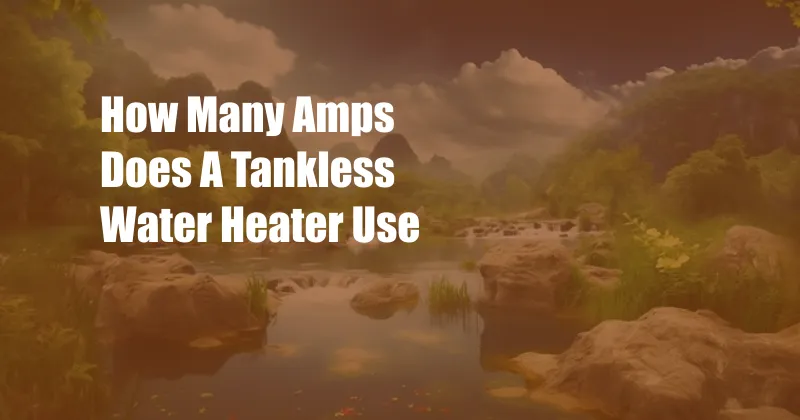
How Many Amps Does a Tankless Water Heater Use?
In this digital era, tankless water heaters are a revolutionary home appliance. Their compact size, energy-efficient operation, and endless hot water supply have made them increasingly popular among homeowners. Understanding the electrical requirements of these water heaters, particularly their amperage consumption, is crucial for safe and efficient installation. This article delves into the world of tankless water heaters, exploring various aspects, including their amperage usage, latest trends, and expert advice, to help you make an informed decision.
Amperage and Tankless Water Heaters
Amperage, measured in amps (A), denotes the amount of electrical current flowing through a conductor. In the context of tankless water heaters, amperage indicates the electrical demand of the unit. Higher amperage water heaters draw more current from the electrical system, requiring thicker wiring and larger circuit breakers.
Determining Amperage Requirements
The amperage requirement of a tankless water heater primarily depends on its power rating, expressed in kilowatts (kW). The higher the power rating, the greater the amperage demand. The following table provides a general estimate of amperage requirements based on power ratings:
| Power Rating (kW) | Amperage (A) |
|---|---|
| 12 | 50 |
| 18 | 75 |
| 24 | 100 |
| 36 | 150 |
Factors Influencing Amperage Usage
In addition to power rating, several other factors can influence the amperage usage of a tankless water heater:
- Water temperature rise: The higher the desired temperature increase, the more power and amperage will be required.
- Water flow rate: A higher flow rate demands more power to heat the water, increasing amperage consumption.
- Efficiency: More efficient water heaters consume less energy and amperage to achieve the same water temperature.
Safety Considerations
Ensuring the electrical system can safely handle the amperage requirements of a tankless water heater is paramount. Overloading the electrical circuit can lead to overheating, wire damage, and potential fire hazards. Always consult a qualified electrician to determine the appropriate wiring size, circuit breaker rating, and grounding requirements.
Latest Trends and Innovations
The tankless water heater industry is constantly evolving, with new technologies emerging to enhance performance and efficiency. Some noteworthy trends include:
- Smart water heaters: These heaters offer Wi-Fi connectivity, allowing remote monitoring and control, adjusting water temperature and energy usage.
- Condensing technology: Condensing water heaters recover heat from exhaust gases, improving efficiency and reducing energy consumption.
- Hybrid water heaters: These systems combine tankless and traditional water heater technologies, providing a balance of endless hot water and lower costs.
Tips and Expert Advice
- Choose the right size: Select a water heater with an amperage that matches your electrical system’s capabilities and hot water needs.
- Consider your usage patterns: Analyze your hot water usage to determine the optimal amperage and power rating for your household.
- Consult a qualified electrician: Seek professional advice to ensure proper installation and electrical safety.
Frequently Asked Questions (FAQs)
Q: How do I calculate the amperage of my water heater?
A: Divide the power rating (kW) by the voltage (V) to obtain the amperage.
Q: Can I use an extension cord to connect my tankless water heater?
A: No, it is never recommended to use an extension cord for a tankless water heater as it can create a safety hazard and void the warranty.
Q: What is the recommended circuit breaker size for a tankless water heater?
A: Typically, the circuit breaker size is 125% of the amperage requirement of the water heater.
Conclusion
Understanding the amperage requirements of tankless water heaters is crucial for safe and efficient operation. By considering the factors that influence amperage usage and following expert advice, you can ensure your water heater meets your hot water needs without overloading your electrical system. As technology continues to advance, exploring the latest trends and innovations will enable you to make informed decisions about your water heating system. So, the next time you think about hot water, remember the importance of understanding amperage and embrace the benefits of tankless water heaters.
Are you intrigued by the world of tankless water heaters? Share your thoughts and experiences in the comments below. Let’s start a conversation about these innovative and energy-efficient home appliances!